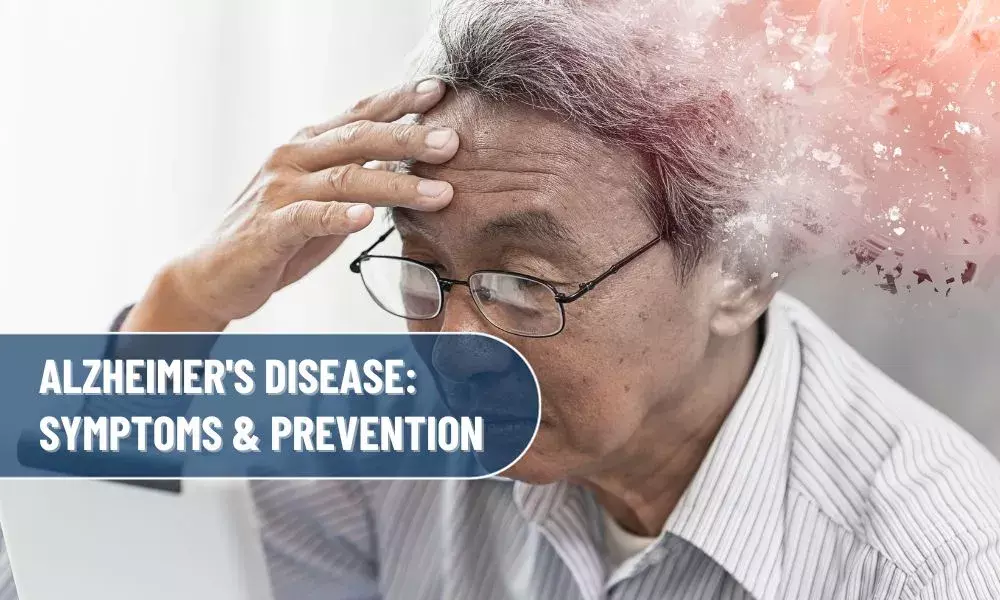September 21 every year is observed as World Alzheimer’s Day to raise awareness about this disease that can happen to anyone.
Alzheimer’s disease (AD) affects roughly 24 million people globally. One in 10 people older than 65 years and nearly a third of people older than 85 years may suffer from this condition.
Table of Content
-
What is Alzheimer’s disease?
-
Early warning signs of Alzheimer’s disease
-
Causes of Alzheimer’s disease?
-
Treatment for Alzheimer’s disease
-
Managing behavioral changes
-
Reducing the risk of developing Alzheimer’s disease
What is Alzheimer’s disease (AD)?
Alzheimer’s disease is a condition related to the brain that causes a constant decline in an individual’s memory, learning, thinking, and organizing skills. It eventually affects a person’s ability to remember and carry out basic daily activities.
The symptoms of Alzheimer’s worsen with time. The greatest known risk factor is increasing age, and the majority of people with Alzheimer’s are 65 and older.
Early warning signs of Alzheimer’s disease
The signs and symptoms of Alzheimer’s disease may differ based on the stage of the condition. However, some common symptoms of AD involve the following:
-
Decline in Memory
-
Loss of command over language.
-
Decline in reasoning and handling of complex tasks
-
Difficulty in understanding visual form and space relationship.
-
Changes in behaviour and personality.
People experiencing Alzheimer’s may initially have difficulty recognizing their mental decline, memory loss, or other signs of Alzheimer’s. However, these signs may be apparent to loved ones. Anyone experiencing memory loss quite often must consult a doctor as soon as possible.
Causes of Alzheimer’s disease?
The human brain contains over a hundred billion nerve cells. These nerve cells work together to fulfil certain functions like thinking, remembering, learning, and planning. The factors that may cause AD are:
-
An abnormal build-up of proteins in our brain may cause Alzheimer’s disease.
-
Age-related changes in the human brain.
-
Genetic factors may also cause Alzheimer’s
-
Environmental and lifestyle factors may also lead to Alzheimer’s symptoms.
-
When brain cells are damaged, it may contribute to AD
Treatment for Alzheimer’s disease
Once diagnosed, Alzheimer’s is a lifetime condition. However, certain medications can temporarily slow the worsening of memory loss and other symptoms. Beginning treatment as early as possible for Alzheimer’s can help maintain daily functioning for a while. Certain constructive approaches towards slowing down the progress of Alzheimer’s may include:
-
Medication
-
Management of behavioral changes
-
Constant monitoring and assistance to the patient
-
Taking helpful measures to remember basic things
-
Keeping stress away
Managing behavioral changes
In case anyone around us or any loved one has been diagnosed with Alzheimer’s disease, then one must take steps to keep them comfortable in their environment and help manage behavioral changes. This can be done by adopting the following measures:
-
Maintaining a familiar environment for them.
-
Avoid changing the layout of their living space.
-
Observe their comfort and what makes them feel discomfort.
-
Keep their things handy so that they do not have to search or look for their stuff.
-
Try to redirect their attention if they are under stress.
-
Keep their surroundings simple and easy to navigate.
Further, medications can cause unpleasant side effects like dizziness, which could lead to falls. If the patient is under medication, observe them closely for any side effects and consult the doctor as required.
Reducing the risk of developing Alzheimer’s disease
Having a healthy lifestyle helps protect our brain from cognitive decline leading to AD. The following strategies may help reduce the risk of developing Alzheimer’s disease:
-
Being Physically active: Exercise of any form generally increases blood flow and oxygen to our brain, which may improve brain cell health. Additionally, it is important to wear protective headgear and avoid head injury during a physical activity if you are participating in activities that increase your risk of a head injury.
-
Stay mentally active: One must indulge in activities that demand mental exercise. Playing board games, reading, solving puzzles, playing a musical instrument, or doing other hobbies that require brain power can be helpful.
-
Stay socially active: Talking regularly to friends and family and joining group activities, such as religious services, exercise classes, book clubs, or community volunteer work, can help an individual to be socially active, thereby reducing the risk of AD.
-
Eat healthy: Following the Mediterranean diet or a balanced, healthy diet that includes antioxidants can help control AD symptoms.
The bottom line is Alzheimer’s disease may cause discomfort and disturb an individual’s normal flow of life. However, with certain measures, the risk of this condition can be controlled and reduced. In case of frequent memory loss, one must consult a doctor at the earliest.





